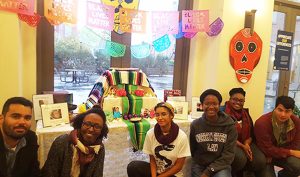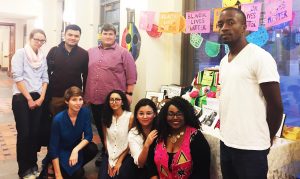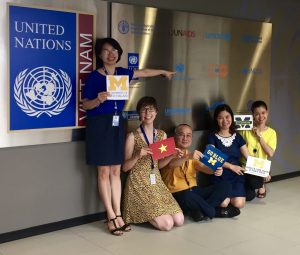I invited Alex Ralph, one of our writing instructors, to write a post about policy writing and why we think it is such an integral part of a policy education. His thoughts are below. Thank you, Alex!
-Beth
The Saturday after the election I participated in an orientation session for prospective graduate students considering applying to the Ford School. I’ve done a few of these faculty panels before, but this year the questions were not the standard ones—about degree requirements, say, or just how fretful a student should be about the quant workload. Instead, from the very beginning of the Q&A, it became clear that the prospective students, like many of us on the panel, were grappling with the purpose of public policy following a stunning election result.
None of us on that panel should have been surprised by the questions—How does the Ford School teach leadership? In light of the election, how do Ford School faculty account for any disconnect between policy analysis and its reception? The election, after all, was pretty much all any of us had been talking about. And in fact, a number of us in the facultariat, myself included, were in need of shoring up our own convictions about the purpose of our work.
To the questions at the panel, I gave an answer that I often give, though in this case with greater emotion and perhaps less eloquence. Specifically, I talked about how Ford School writing instructors prioritize an engagement with opposing points of view. We do so, I said, in the spirit of intellectual generosity and also as a self-check to our own ideas. No matter our political beliefs, our convictions gain persuasiveness through challenge: we must examine them against the strongest arguments of our opponents. This, as I told the prospective students, embodied much of our Ford School writing pedagogy. If your goal is to persuade, you must seek out the legitimacy of an opposing view and then battle it.
If in theory, this sounds fine and good, albeit a tad macho—a MMA steel-cage match of ideas—in my non-teaching life these last two weeks, I’ve struggled to follow my own über-rationalist policy writing advice. Ultimately, it took a recent writing workshop session to help me articulate why, despite the shock of an election whose results I find particularly dire, I continue to value the role that good policy analysis and prose can play.
At the end of this recent writing session, the student, echoing the questions at the orientation session, asked if I thought facts and analysis mattered, or was it the manipulation of facts and analysis that really determined public policy. Now such a question is probably better answered by someone far above my pay grade, but give a writing instructor an invitation to pontificate and look out.
My answer consisted of two parts. First, policy writing must always strive to hold in mind that we are all more complex creatures than a single identity marker can capture. If, as policy students and policy professionals, we must draw upon data in order to think through generalizable points, we also know that the sheer mystery of the human heart will usually elude neat classification. Terms may obscure as much as they reveal.
Second, as I told this student, it is my belief that we can’t over-worry about the reception to our work. Yes, you can’t naively assume that what you deem to be the strongest evidence will automatically persuade others. It behooves us to think hard about how we present information. But even if our best ideas don’t win the day, that doesn’t free of us of the obligation to continue to put those best ideas forward.
Thus, I said—beginning again to believe it myself—we must continue to engage with differing points of view. And we must continue to try to write and think as clearly and honestly as we can. If, for no other reason, than to be our very best selves. For, ultimately, it is also our own souls we must try to save.

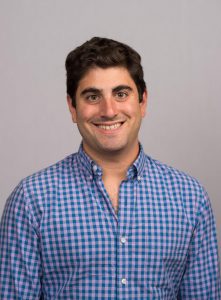
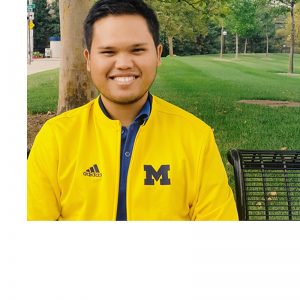 My name is Krisjanuardi Aditomo and I am from Jakarta, Indonesia. I graduated from Institut Teknologi Bandung, Indonesia, with a degree in Industrial Engineering. I had been working for the Central Bank of Indonesia since then, until right before coming to the Ford School. Because I am sponsored by the Central Bank, I was able to waive the internship requirement. So instead of doing internship, I spent my time traveling in South America (Chile, Peru, and Colombia) and some part of the US last summer. I also worked for the University of Michigan International Center during the summer as a peer advisor for the 2016 International Center’s Summer Orientation. My policy focus is economic development, especially in developing country.
My name is Krisjanuardi Aditomo and I am from Jakarta, Indonesia. I graduated from Institut Teknologi Bandung, Indonesia, with a degree in Industrial Engineering. I had been working for the Central Bank of Indonesia since then, until right before coming to the Ford School. Because I am sponsored by the Central Bank, I was able to waive the internship requirement. So instead of doing internship, I spent my time traveling in South America (Chile, Peru, and Colombia) and some part of the US last summer. I also worked for the University of Michigan International Center during the summer as a peer advisor for the 2016 International Center’s Summer Orientation. My policy focus is economic development, especially in developing country.